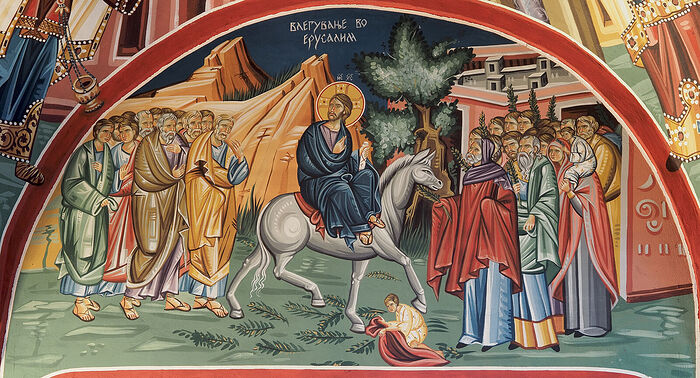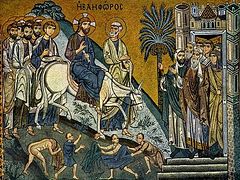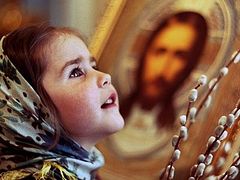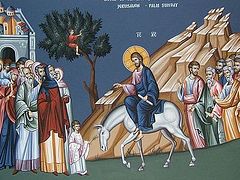“Let us also come today, all the new Israel, the Church of the Gentiles, and let us cry with the Prophet Zechariah: Rejoice greatly, O daughter of Zion; shout aloud, O daughter of Jerusalem; for behold, thy King comes unto thee: He is meek and brings salvation.”1
 Triumphal entry of Jesus into Jerusalem, Nativity of the Theotokos Church (Bitola), Macedonia. Photo: wikipedia.org
Triumphal entry of Jesus into Jerusalem, Nativity of the Theotokos Church (Bitola), Macedonia. Photo: wikipedia.org
It is with great spiritual solemnity that, like ancient Israel, the New Israel, that is, Christians, celebrates this present feast.
But during the most solemn entry of the Lord into Jerusalem, we see more than one joy and triumph. The Lord wept during the rejoicing of the people over the sorrowful fate of Jerusalem, which would soon be preparing to reject its Messiah (Lk. 19:37-44). Consequently, the rejoicing of the people was frivolous. Indeed, the people thought they were meeting their coming earthly King, Who would not only not detach them from their excessive predilection for earthly goods, but would come to Jerusalem precisely to give such goods to His people in abundance; to bless not with Heavenly, but with earthly peace, and with the good fortune of Israel.
Moreover, Israel even feared to believe in Christ as the spiritual King Who came to deliver the hearts of people from the bonds of earthly passions by His Cross and sufferings, and said through its leaders: If we let [Christ] thus alone, all men will believe on Him: and the Romans shall come and take away both our place and nation (Jn. 11:48), that is, more than anything, these leaders feared that Israel, having come to believe in Christ, would lose its earthly kingdom and would have to renounce the possession of what is most dear to its heart.
And was not our spiritual rejoicing this day also frivolous, my brethren, like that of ancient Israel? For have we deepened the spiritual celebration of this present feast with those thoughts of the Cross and sufferings that occupied the Lord Himself as He entered Jerusalem? Was it faith in the victorious power of Christ’s sufferings that lifted and filled our souls with joy, which aroused the Prophet to exclaim: Rejoice greatly, O daughter of Zion; shout, O daughter of Jerusalem: behold, thy King cometh unto thee: He is just, and having salvation—and will save you by His sufferings, by the blood of [His] covenant (Zech. 9:9, 11)? Have we thought about the fact that although the spirit of Christ Himself was filled with victorious triumph at the thought of the coming of the time for the glorification of the Son of Man, He indicated the path to this glory, saying: Except a corn of wheat fall into the ground and die, it abideth alone: but if it die, it bringeth forth much fruit (Jn. 12:24); that it is only by “hating” ourselves, that is, our earthly predilections, that we can experience the genuine spiritual triumph of Christ; and it is only by following Christ through suffering that we can enter into the joy of our Lord (Mt. 25:21)? We’ve made earthly pleasure the rule of our life to such a degree that sometimes we can barely keep from looking for it even in church, and we start to feel very weary being there without experiencing continuous, even purely earthly pleasure. Of course, the Lord is generous, and He doesn’t deprive any of us of the spiritual consolation of faith, despite all our attachment to earthly pleasures.
Rejoice in the Lord always: and again I say, Rejoice (Phil. 4:4): We also hear today, like Old-Testament Israel, the call of the holy Church by the lips of the Apostle. But after all, the Lord sent this joy and spiritual consolation to inspire us more for spiritual labors.
People today, rarely experiencing an upsurge in their spiritual lives, complain about the Church itself, saying that going to church doesn’t awaken their spiritual life—as though the Church doesn’t care about earthly life, which it should sanctify with the treasures of the spiritual life it preserves. But how can the Church sanctify the life of those who not only don’t seek this sanctification, but who moreover resist it, when tak[ing] delight in approaching to God, according to the word of the Prophet, they fulfill their own will (Is. 58:2-3)? How can “their voice be heard on high” (cf. Is. 58:4), if even while in church, lifting up prayers with their mouths, they only wander in their hearts through the crossroads of earthly pleasures and propensities? Did not the Lord Himself this day drive out of His Temple those who brought greed and other earthly passions into the house of prayer, thereby turning it into a den of thieves (Mt. 21:12-13, Is. 56:7, Jer. 7:11)? Behold, your house is left unto you desolate (Mt. 23:38), the Lord said to these people, pointing out that with the destruction of the Temple, the entire “vineyard” of Israel became desolate; the whole spiritual life of Israel became desolate from the thorns of earthly predilections and froze (Mt. 21:33-43, Is. 5:1-7).
Henceforth, instead of Israel, this house is given to the Gentiles, according to the word of the Lord, spoken in ancient times by one of the prophets of Israel: Mine house shall be called an house of prayer for all people (Is. 56:7). Henceforth, when out of the mouth of babes and sucklings, the Lord hast perfected praise in denunciation of non-believing Israel’s enmity for Christ (Ps. 8:3, Mt. 21:15-16), He creates for Himself new children from among the pagan peoples—better, not by nature, but by grace, fulfilling that which was spoken by the Forerunner of Christ: God is able of these stones to raise up children unto Abraham (Mt. 3:9), as He Himself says to the unbelieving sons of Israel: If these [sons of Israel] should hold their peace, the stones would immediately cry out (Lk. 19:40); that is, they will turn to Christ, in the words of the Church hymn, “figuring (prefiguring in the Old Testament) the stony-hearted Gentiles”2—pagans, who hitherto were also, like Israel, hard-hearted, but whose hearts were softened through faith in Christ and love for Him.
Let us fear this “emptying of the spiritual house” and the petrification of our hearts; and all of us, the New Israel, especially we pupils of the spiritual school, are called to be not only the vineyard of the Lord, but also the workers in Christ’s vineyard, so the Lord might not say to us: Behold, your house is left unto you desolate (Mt. 23:38)… When ye come to appear before Me, in the Temple, who hath required this at your hand, to tread My courts? (Is. 1:12). May our time in church in the days of spiritual triumph or repentance not be an empty or fruitless “trampling of the courts of the Lord” (cf. Is. 1:12), but may the spiritual petrification of our hearts be softened and may our souls be constantly filled with the highest spiritual life of Christ, purified from the passions! Amen.




